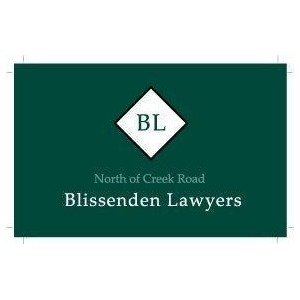Best Corporate Governance Lawyers in Moonah
Share your needs with us, get contacted by law firms.
Free. Takes 2 min.
List of the best lawyers in Moonah, Australia
About Corporate Governance Law in Moonah, Australia
Corporate governance refers to the systems, processes, and rules that guide how companies are directed and controlled. In Moonah, Tasmania, Australia, businesses of all sizes are expected to follow both national corporate law, such as the Corporations Act 2001 (Cth), and specific state regulations. Effective corporate governance ensures that companies operate transparently and ethically, and that directors and officers act in the best interests of their company, shareholders, and stakeholders. Corporate governance is vital for compliance with the law and for maintaining the trust of customers, partners, and investors.
Why You May Need a Lawyer
Legal advice on corporate governance can be indispensable in a variety of scenarios. Common situations include forming a new company and establishing governance frameworks, dealing with complex director or shareholder disputes, navigating mergers or acquisitions, complying with disclosure requirements, managing conflicts of interest, understanding director or officer duties, addressing regulatory investigations, handling whistleblower issues, and updating company constitutions or governance policies. A lawyer ensures that a business meets all legal requirements and helps safeguard it from potential penalties and reputational risks.
Local Laws Overview
Moonah businesses must operate within the broader Australian legal framework. The primary law affecting corporate governance is the Corporations Act 2001, which covers director duties, financial reporting, shareholder rights, and governance structures. Importantly, additional rules may apply at the state level in Tasmania, particularly for not-for-profits and incorporated associations regulated under the Associations Incorporation Act 1964 (Tas). Compliance with Australian Securities and Investments Commission (ASIC) requirements is essential for most companies. Privacy, anti-money laundering, and anti-bribery laws may also impact governance policies and reporting obligations. Local government regulations may affect matters like the registration and operation of some small businesses or clubs.
Frequently Asked Questions
What are my basic duties as a company director in Moonah?
Directors have legal duties such as acting in good faith, exercising care and diligence, avoiding conflicts of interest, and ensuring the company complies with its legal obligations, including reporting and disclosure.
Do all businesses in Moonah need formal corporate governance policies?
While larger or listed businesses are usually required to have formal governance structures, small businesses benefit from clear policies to ensure compliance and protect owners and stakeholders.
What happens if there is a dispute between company directors?
Disputes can be managed internally or may require mediation, legal advice, or, in some cases, court intervention depending on the severity and impact on company operations.
How do I handle conflicts of interest in my company?
Conflicts of interest must be declared and managed according to legal requirements. This may involve disclosure to the board, abstaining from certain decisions, and documenting all actions.
Is my company required to hold annual meetings?
Companies, particularly public ones, are typically required to hold annual general meetings for shareholders. Proprietary (private) companies face different requirements but may still need to have regular meetings as per their constitution.
What are the consequences of poor corporate governance?
Poor governance can lead to regulatory penalties, civil or criminal liability for directors, damage to the company’s reputation, financial losses, and loss of investment.
Are not-for-profit organizations in Moonah subject to the same rules?
Not-for-profits must comply with specific local and national regulations, such as the Associations Incorporation Act 1964 (Tas), and often have additional governance principles imposed by the Australian Charities and Not-for-profits Commission (ACNC).
What is ASIC's role in corporate governance?
ASIC is the national corporate regulator overseeing company registration, monitoring compliance, and investigating suspected misconduct in Australian businesses, including those in Moonah.
How can I change my company’s constitution or governance documents?
Alterations usually require a resolution passed by the board of directors or shareholders, with specific requirements set out in the company’s constitution and the Corporations Act 2001.
What support is available for directors seeking training on governance?
Directors can access training and resources through professional bodies like the Australian Institute of Company Directors, legal advisors, and local government programs in Tasmania.
Additional Resources
People in Moonah seeking more information or guidance on corporate governance can consult the following organizations:
- Australian Securities and Investments Commission (ASIC) - National corporate regulator
- Australian Institute of Company Directors - Training and events for directors
- Tasmanian Government Business Tasmania - Guidance for local businesses
- Australian Charities and Not-for-profits Commission (ACNC) - For not-for-profit entities
- Law Society of Tasmania - Referral to local legal practitioners
Next Steps
If you require legal advice or support regarding corporate governance in Moonah, start by identifying your specific needs such as compliance review, dispute resolution, or board training. Gather all relevant company documents and seek professional assistance from an experienced corporate lawyer familiar with both national and Tasmanian law. You may contact the Law Society of Tasmania to find a suitable practitioner or attend local business support events for further information. Early legal advice can help protect your business, maintain good governance, and foster lasting business success.
Lawzana helps you find the best lawyers and law firms in Moonah through a curated and pre-screened list of qualified legal professionals. Our platform offers rankings and detailed profiles of attorneys and law firms, allowing you to compare based on practice areas, including Corporate Governance, experience, and client feedback.
Each profile includes a description of the firm's areas of practice, client reviews, team members and partners, year of establishment, spoken languages, office locations, contact information, social media presence, and any published articles or resources. Most firms on our platform speak English and are experienced in both local and international legal matters.
Get a quote from top-rated law firms in Moonah, Australia — quickly, securely, and without unnecessary hassle.
Disclaimer:
The information provided on this page is for general informational purposes only and does not constitute legal advice. While we strive to ensure the accuracy and relevance of the content, legal information may change over time, and interpretations of the law can vary. You should always consult with a qualified legal professional for advice specific to your situation.
We disclaim all liability for actions taken or not taken based on the content of this page. If you believe any information is incorrect or outdated, please contact us, and we will review and update it where appropriate.









